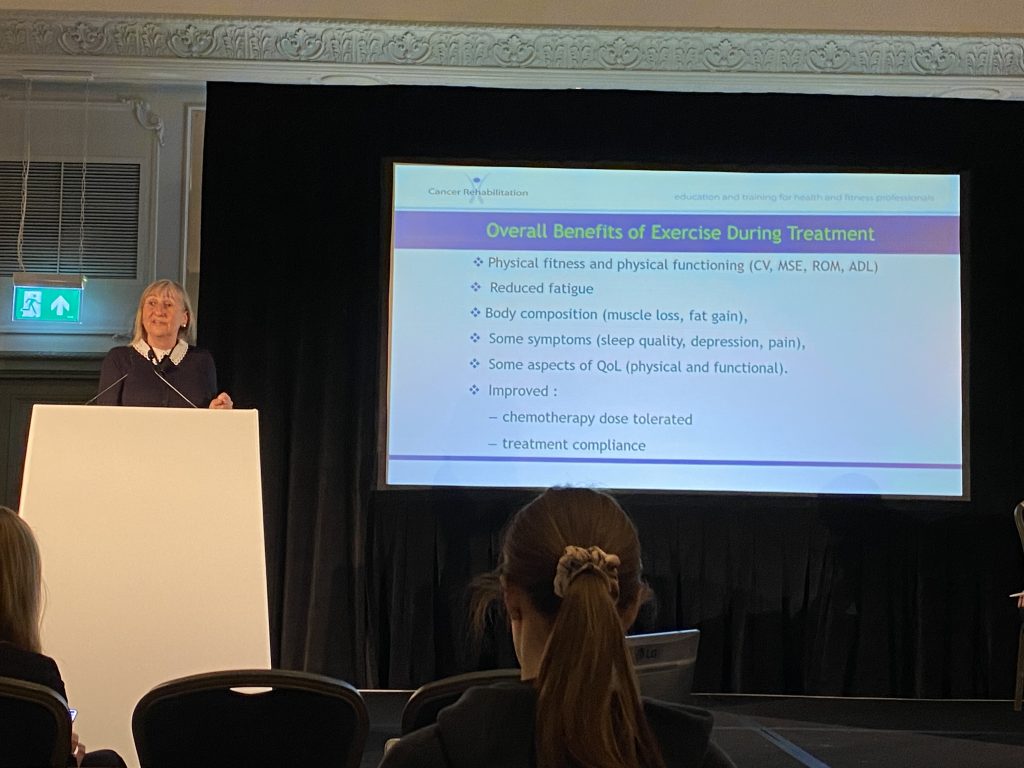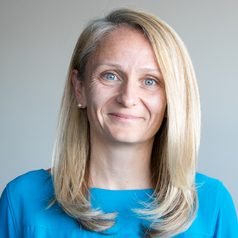A month in the life of Professor Anna Campbell…
We thought it would be interesting to show how Professor Campbell is working tirelessly to promote exercise after a cancer diagnosis. We will be following her for a couple of weeks as she travels round the world, sharing information from the conferences she is speaking at and showing you the places she visits!
Between now and the end of June, she will be travelling to Brighton, Sheffield, San Diego, and Copenhagen. We will also be posting some videos on our Instagram throughout – have a look to follow along and find out more.
Brighton – May 25th 2022

On Wednesday, I was in Brighton at The British Journal of Sports Medicine (BJSM) Live Conference. This was the British Medical Journal’s first ever event for the sports and exercise medicine community. It was possible to attend in person or on line – the conference participants were from over 22 countries. I was in the first group of speakers – with the topic of Clinical populations and sport. My aim was to present the evidence that it is OK/beneficial to get back to exercising/ sport as soon as possible after a cancer diagnosis.
Interesting conversations developed in the discussion session about the fact that lots of sports people are not sure what they can do and how hard and how often they can train during the various stages of their cancer journey. A lot of mixed or vague messages out there! I was delighted to see Dr Robert Sallis on the list of speakers. Bob is a great advocate of the health benefits gained through physical activity and has championed Exercise is Medicine™, a program designed to support doctors to prescribed exercise. He showed some interesting data on Covid risk and symptoms severity – physical inactivity was the highest risk factor after age and organ transplant and was a higher risk than obesity! I asked about correlation between fitness and long Covid – but he said there is no strong data on that yet. Something to watch… to ensure we give the correct message to our clients with cancer and long Covid.
Sheffield – May 27th 2022
On Friday, I was in Sheffield at the new Advanced Wellbeing Research Centre and National Centre for Sport and Exercise Medicine. This was a meeting of all those who were involved in production of the Principles and Guidance for Prehabilitation within the Management and Support of People with Cancer. It is now 3 years since we published this document, and both before and during the COVID pandemic, various models of service have developed in the UK. This meeting was to discuss how the research and current services are being assessed in order to try to ensure we all use the same tools to measure success. Brief presentations of the Manchester Prehab Cancer, Designing Outcomes for Optimising Colorectal Prehab (DISCO) and the Wesfit / Safefit programmes led to lively discussion from all participants. We then heard from prehabilitation programmes in Canada, Italy and Australia and what tools they use to screen and assess exercise / physical activity levels, nutritional status and psychological / emotional needs. In the afternoon we started the process of a consensus on what should be standardly screened and measured as an outcome and when and by whom. I will update you when we have finished this work.
ACSM Annual Conference, San Diego – May 31st – June 4th 2022
After two years, it was great to attend the ACSM Annual Conference in-person – especially as it took place in the beautiful city of San Diego this year. Anna ACSM / conference hall/ shoreline view? This is a special place to me, because when I was 21 I left my home in Glasgow and everyone I knew to go to work in the immunology research labs of Scripps Clinic in the beautiful suburb of La Jolla. It was quite emotional coming back and visiting places that contain so many important milestones and memories 40 years later.

I also had the wonderful opportunity to many of my exercise oncology colleagues such as Katie Schmitz, Kristen Campbell, Amy Kirkham and Lucia Sagarra and have the odd night out for tacos and margaritas. As you already saw in a previous clip on our Facebook – there is always a 5K run supported by Gatorade – I love doing that run – even if it means getting up at 5.30!!
The conference was full of extremely interesting topics – lots of talks and posters on obesity, children’s physical activity levels and on the links between exercise and Covid-19. I concentrated on the exercise oncology talks – and there were many!

The conference got off to a great start with a presentation by Mary Kennedy – whose research area is implementation of exercise oncology programme. She talked about how we need to look at the HOW – because failures in programmes are usually because they have not really studied the HOW to implement – “the best evidence based exercise programme is not effective if nobody uses it” Implementation requires deliberate planning. Some great examples of HOW were discussed – e.g. EnACT – where the exercise programme is provided to patients in the chemotherapy suite (but not undertaken there).
A “three clicks solution” where oncology clinicians set automated Electronic Medical Record (EMR) exercise script (prescription) to the programme provider. Another study did show the benefits of embedding a cancer exercise trainer into the chemotherapy infusion suite. The exercise equipment was a low cost investment – arm and leg ergometer- gynae DURING chemo – need buy in from oncologist and the clinical nurses. They all supported this and there were no adverse events. Keite Schmitz gave an update on the evidence and guidelines and stated that only 14.7% patients reported being referred to an exercise programme during oncology treatment. We need more communication with health care professionals of programmes.

There was another symposium on exercise oncology and effects of treatment on the heart and lung – with some interesting long term follow up of cancer survivors showing last effects of treatments on cardiorespiratory fitness. Another symposium described four big randomised controlled trials currently recruiting to look at the effects of exercise on treatment tolerability – asking does is allow them to tolerate the full dose of prescribed chemotherapy? One trial was in rectal cancer patients in a neoadjuvant setting (i.e. where treatment is given as a first step to shrink a tumour before the main treatment, which is usually surgery), one study is looking at advanced ovarian cancer patients, one at colon cancer and the final one in women >65 with breast cancer.
Finally there was some excellent talks on exercise on tumour biology using mouse models – although not directly applicable to humans – they show how exercise directly affects the tumour and its surrounding area. It looks as if exercise causes better infusion and boosts the appropriate interleukins and immune cells to intervene to kill the tumour.
I also had the opportunity to meet the ACSM education lead Franics Neric and Katherine Haughey – CanRehab will be providing AVSM with a training course to enable the appropriate ACSM members to become cancer exercise specialists. More on that soon!
The University of Liverpool will shortly be starting a funded study that will investigate a patient-centred approach to exercise for head and neck cancer survivors.
UofL are seeking an appropriately qualified and enthusiastic Cancer Exercise Specialist to join a team working on a new multidisciplinary project ‘Activity as Medicine in oncology for Head and Neck‘.
THE JOB:
This two-year study is funded by a NIHR Research for Patient Benefit award and is based at the University of Liverpool and Liverpool University Hospitals Foundation Trust. This is a multiple methods feasibility study to investigate delivery of personalised, flexible, and collaborative exercise programmes in head and neck cancer. Findings will inform further research in testing for effectiveness, how best to engage these patients in exercise and how to integrate the intervention into day to day care. The appointee will join a wider community of researchers and clinical academics, working across these sites and our partner organisation at South Tyneside and Sunderland NHS Foundation Trust.
THE ROLE:
The appointee will join a highly supportive clinical-academic research team, linking with a wider community of researchers and clinical academics, working across these sites and our partner organisation at South Tyneside and Sunderland NHS Foundation Trust. They should hold a Level 4 vocational fitness qualification in cancer and exercise/rehabilitation and have experience in prescribing, instructing, and supervising exercise with cancer patients. This role would suit a self-employed fitness professional.
MORE INFO:
More information can be found on the job listing by clicking here: vacancy details.
We know that the link has been faulty for some, so we have made the full description document available below.
Albion in the Community’s Brighter Outlook physical activity programme is expanding into West Sussex, meaning that there are two new job opportunities.
Thanks to funding from the Surrey and Sussex Cancer Alliance and West Sussex CCG, AITC are are looking for motivated and experienced Level 3 GP Referral Specialists/Level 4 Cancer Exercise Specialists to join their team to support the delivery of this award-winning service.
THE JOB:
2 x Physical Activity Cancer Coaches (up to 28 hours/week) – You will deliver personalised one-to-one support and cancer prehab/rehab classes across West Sussex (including Mid-Sussex) to support people living with and beyond cancer to become more active and improve their quality of life.
MORE INFO:
Visit AITC’s jobs page for further information and apply through this link – AITC Vacancies
For further information on the roles, please contact Rosie Sadler on 07867 000 041 or rosie.sadler@albioninthecommunity.org.uk
